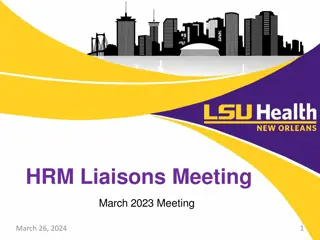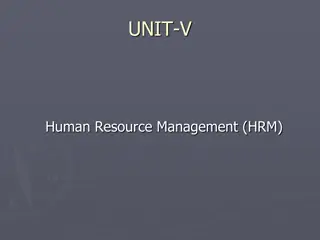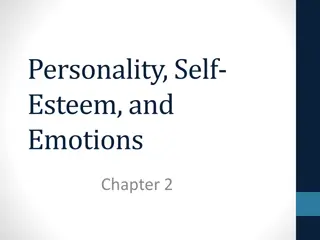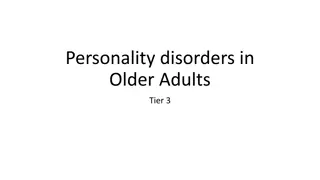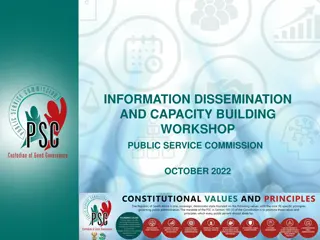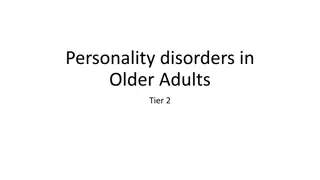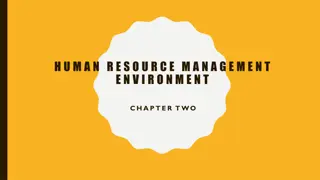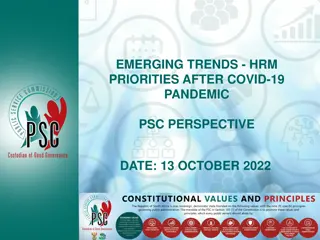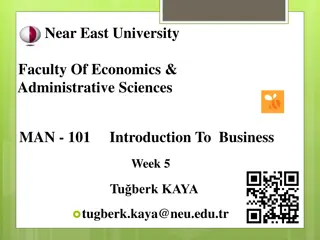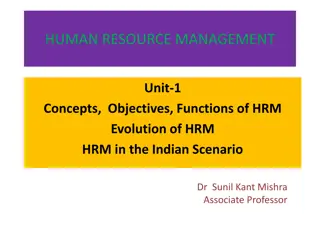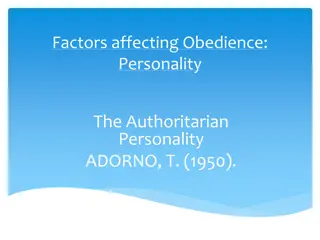
Research Interests in HRM: Personality Testing and SJTs
Within Human Resource Management (HRM), Dr. Nhung T. Nguyen's research focuses on personality testing in HR selection, exploring the influence of faking on psychometric structures. Publications cover topics such as the validity of personality tests and situational judgment testing (SJT), considering factors like applicant faking and diversity in testing outcomes. With a background spanning areas of Human Resource Management, Organizational Behavior, and Research Methods, Dr. Nguyen's work delves into the complexities of understanding individual differences in the workplace.
Download Presentation

Please find below an Image/Link to download the presentation.
The content on the website is provided AS IS for your information and personal use only. It may not be sold, licensed, or shared on other websites without obtaining consent from the author. If you encounter any issues during the download, it is possible that the publisher has removed the file from their server.
You are allowed to download the files provided on this website for personal or commercial use, subject to the condition that they are used lawfully. All files are the property of their respective owners.
The content on the website is provided AS IS for your information and personal use only. It may not be sold, licensed, or shared on other websites without obtaining consent from the author.
E N D
Presentation Transcript
As with all parts of the business, the operations function is affected by external influences. Although the business cannot control these factors, good management is about monitoring the external environment and ensuring that the business has the capacity to adapt to these changes and, thus, ensure the sustainability of the business.
GLOBALISATION, TECHNOLOGY, QUALITY EXPECTATIONS, COST- BASED COMPETITION, GOVERNMENT POLICIES, LEGAL REGULATION, ENVIRONMENTAL SUSTAINABILITY
GLOBALISATION Globalisation has both a positive and negative influence on a business. It provides the business with new customers, access to new technology and financial markets. It also gives the business the provision to use cheaper inputs and/or more cost effective production processes. The operations department may decide to relocate to another country for cheaper labour or more flexible government regulations. On the negative side, globalisation also means greater competition for a business as it is competing with other businesses overseas.
TECHNOLOGY For the operations department, having access to new technology will mean that a business can often make its production process more efficient. Taking advantage of new technology will often provide a competitive advantage; however, implementing this can be expensive. Technology gives a business access to new production processes and new product lines, but it can also mean that existing products become out dated. The challenge for the operations department of a business is to ensure that they refresh their product lines and production techniques.
An example of this is when photo labs that processed films had to change their processes when digital cameras became popular. These businesses had to change so that customers could download their own photos and select which ones to print.
QUALITY EXPECTATIONS Quality expectations of consumers influence a business because if the product or service is not considered good enough, especially compared to the way it is marketed, it can lead to disappointment and consumers taking their business elsewhere. A business also expects certain quality standards from its suppliers. If the inputs are not satisfactory then the overall quality of the product/service may be affected. Similarly, if the quality of the input is too high to suit the needs of the business, then the price of the product is increased to maintain profit margins. Both situations result in a business potentially losing customers.
COST BASED COMPETITION When a business becomes a cost leader, it will attract competition into the market other businesses that will try to offer a similar product at similar low prices. An example of this is in Australia is Virgin Airlines, Jetstar Airlines and Tiger Airlines all competing against each other to attract customers to a low price, no frills product. And, when Burger King offered a $4.95 lunch deal, MacDonald s soon followed. Being a cost leader, and maintaining this position, can put pressure on the operations function as management will be constantly having to look for ways to decease production costs.
GOVERNMENT POLICIES AND LEGAL REGULATION Government policies will influence the production processes of the business. The government may increase taxes on some inputs making the production of goods and services more expensive. The government may ban some inputs or a process, leading to costly research as the business tries to find an alternative. Rules and regulations regarding the operations of the business will also affect the production process.
In regard to supermarkets and banks in Australia, mergers and takeovers are looked at closely, in case they begin to monopolise competition. On the other hand, the government may create changes that benefit the business; however, these benefits will be available to other businesses to take advantage of too. On the positive side, rules and regulations create a level playing field for all businesses
ENVIRONMENTAL SUSTAINABILITY AND SOCIAL RESPONSIBILITY In today s business world there is a strong emphasis on doing the right thing by society and the physical environment. In order to attract and keep customers, businesses must be seen to be having practices that lead to environmental sustainability as well as showing a responsibility to the society in which they operate.
It falls upon the operations department of each business to ensure that its production processes do not endanger the physical environment. This may be expensive for the business but ignoring this responsibility will have the possible repercussions of fines, legal action, loss of investors, negative media coverage and a loss of customers.
CORPORATE SOCIAL RESPONSIBILITY the difference between legal compliance and ethical responsibility environmental sustainability and social responsibility Many laws cover the running of a business and failure to follow these laws will lead to a range of legal action resulting in penalties from fines to imprisonment, but, as mentioned above, businesses today are under pressure to behave ethically. This means doing the right thing by stakeholders, even if it is not a legal requirement.
Nearly all businesses today recognise their role in environmental sustainability, ensuring that resources are used appropriately so that they are available to future generations. A business that fails to be seen to do the right thing by the environment will lose customers. Environmental awareness has created new business opportunities for some entrepreneurs and let other business gain a competitive advantage.
A visit to the websites of many medium to large businesses will see that they set out how they show their corporate social responsibility. For the operations manager it will mean ensuring that production processes do not affect society in a negative way, otherwise it could mean a loss of customers. Ethical standards may look good to the community but can be expensive to implement.

